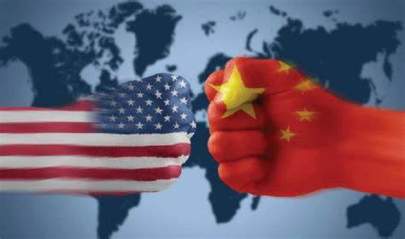China - Conundrum
Monday, May 15, 2023
Written by Laurence F Sanford, Senior Analyst ASCF
Categories: ASCF News ASCF Articles

A “conundrum" is an intricate or difficult problem.
China is the largest external conundrum facing the United States. How can the United States solve the problem that the totalitarian Chinese Communist Party’s (CCP) objective is world domination? China is an economic and military powerhouse. But China has internal issues that present future dangers to the CCP and opportunities for American civilization.
Demographics is a ticking time bomb. China’s population of 1.4 billion people is declining, with an average age of 39. China is facing payback for its brutal, inhumane one-child policy from 1979 to 2015. Forced sterilization and abortions were forced on women with more than one child. Those families that evaded the abominations faced jail time, social stigma, and loss of social credits for the child to attend school and receive medical and other benefits.
Families faced a dystopian choice in the one-child policy. In Chinese culture, a male baby is preferred over a baby girl. Thus, if it were determined that the baby in the womb was a girl during the pregnancy, the unborn baby girl would be aborted. The family wanted to allocate its one slot for a boy. This resulted in an unnatural population ratio of more boys than girls. Now there are approximately 35 million more men than women, and about half are of marriageable age. Women are generally a civilizing force in society, and 20 million single men roaming around China without women does not lead to domestic happiness, peace, or tranquility.
4-2-1 are numbers that matter. Four grandparents, representing two couples, with each couple having one child, results in two children of the next generation becoming one couple. That one couple then has one child. When the four grandparents reach the retirement age of 60, there are three people supporting their retirement. (Their two children and one grandchild) When they reach eighty, their two children begin retirement resulting in four people being supported by the one grandchild. A society with this ratio will not prosper economically or culturally.
Totalitarian censorship saps the soul and controls the body. Religious citizens are persecuted. Muslim Uighurs are enslaved, mosques are destroyed, and public displays are severely limited. Amazingly, Muslims outside of China say nary a word about the persecution. Yet a Westerner burning the Quran creates a firestorm, riots, and economic boycotts in the Muslim world.
Fulan Gong is a Chinese spiritual movement founded in 1992 by Li Hongzhi. It is an offshoot of qigong, the “discipline of the vital breath,” incorporating traditional Chinese medicine and self-cultivation practices. In the late 1970s, the CCP recognized qigong as scientific and allowed qigong to flourish. Millions of adherents followed the practice until the CCP realized qigong and Fulan Gong represented a threat to their rule. The power of the state cannot be challenged, so the state called them a heretical cult and began to persecute jail and harvest the body organs of Fulan Gong followers. Li Hongzhi fled to the United States, where his followers thrive, including founding media outlets such as “The Epoch Times.”
Christianity is also suppressed. Communism is inherently opposed to Christianity --- there can only be one higher power, and that is the state. The current pope of the Roman Catholic Church has submitted not only to Islam but has submitted to the CCP. He said nothing when 90-year-old Cardinal Joseph Zen of Hong Kong was arrested under Chinese security laws for colluding with foreign forces. The pope allows the CCP to appoint bishops.
Other internal issues that present dangers to CCP rule are citizen rage at the pollution of land, air, and rivers. China is by far the biggest polluter of carbon dioxide in the world. While the United States is shutting down coal and natural gas power stations jeopardizing national and economic security, China is building two coal power plants per week.
Corruption is rampant. The abuse of political power by CCP members for private gains impacts all aspects of society, including healthcare, education, law enforcement, and economic development.
Summary
The first step in solving a problem is identifying the problem, which is recognizing the CCP’s goal to dominate the world with unrestricted warfare using all organs of the country (state, business, and military).
The United States should implement a policy of reciprocity. If China does not allow American firms access to China, then America should not allow Chinese firms access to America. TikTok and WeChat are CCP organs poisoning American culture, and they should be banned until China allows American social media companies such as Google and Facebook to poison their culture.
Increase trade barriers until the balance of trade is equalized. For a number of years, China has had a favorable trade balance of $350 billion/year with the United States. This allows China to finance worldwide programs such as the Belt and Road Initiative and Confucius Institutes enhancing China’s position to the detriment of the United States.
Reduce the number of Chinese students in American universities to equal the number of Americans in China. On average, 10,000 Americans study in China versus more than 300,000 Chinese who study in America. Many of the Chinese students are CCP tools gathering leading-edge technologies to bring back to China.
Strengthen soft power gray zone activities to highlight CCP atrocities. Strengthen hard power by building up the military. Assert international law and freedom of the sea in the South China Sea. Build alliances with democratic countries that are being bullied by China. Increase cyber security capabilities to prevent CCP theft of intellectual and military secrets.
Peace Through Strength!
Laurence F. Sanford
Senior Analyst
American Security Council Foundation
www.ascf.us




